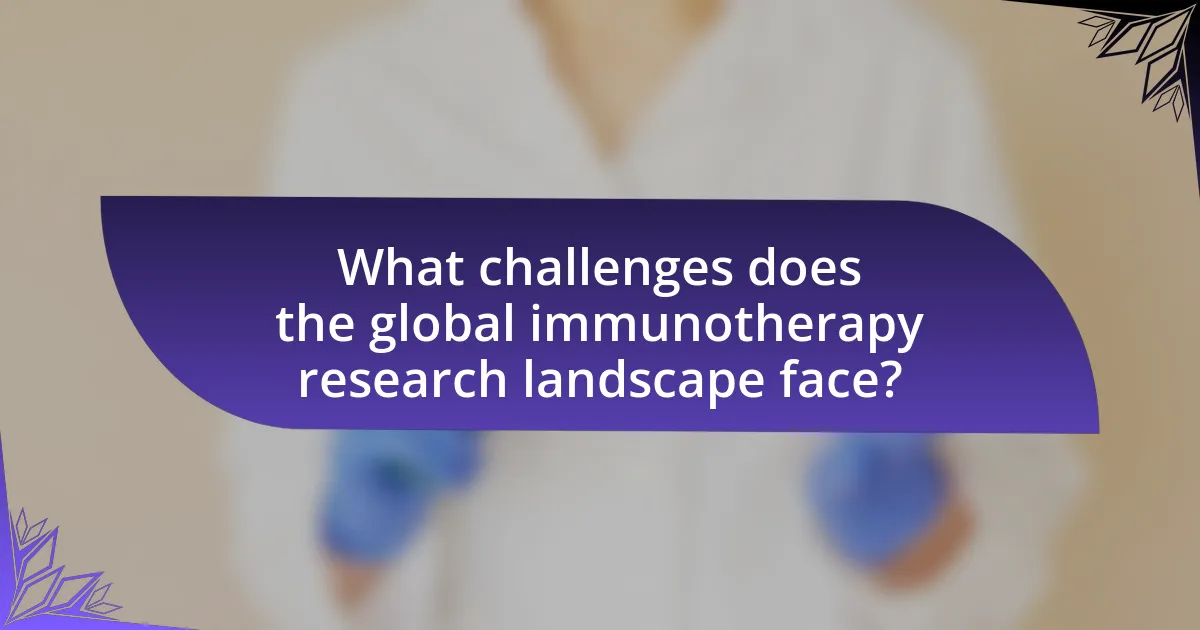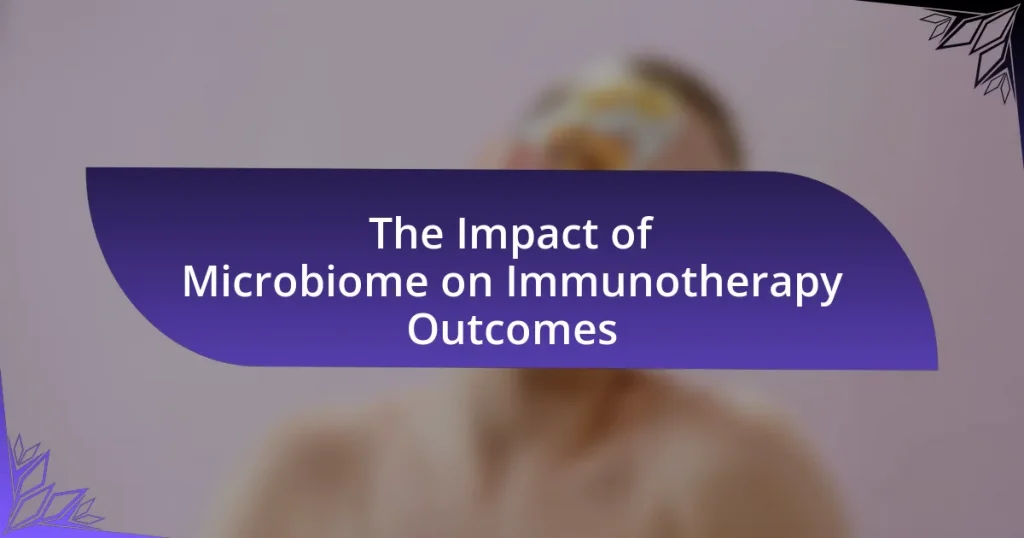The article examines the global landscape of immunotherapy research, highlighting significant advancements and investment trends in the field. As of 2023, the immunotherapy market is projected to reach approximately $200 billion by 2026, driven by innovations such as checkpoint inhibitors and CAR T-cell therapies. Key research hubs include the United States, Europe, and Asia, with notable contributions from leading institutions and pharmaceutical companies. The article also discusses the evolution of immunotherapy, key milestones, current trends, and the challenges faced in regulatory and ethical domains, while emphasizing the importance of collaborations and funding opportunities in advancing research. Additionally, it explores future directions, including personalized medicine and the role of patient feedback in shaping research methodologies.

What is the Global Landscape of Immunotherapy Research?
The global landscape of immunotherapy research is characterized by rapid advancements and increasing investment across various cancer types and autoimmune diseases. As of 2023, the immunotherapy market is projected to reach approximately $200 billion by 2026, driven by innovations in checkpoint inhibitors, CAR T-cell therapies, and monoclonal antibodies. Major research hubs include the United States, Europe, and Asia, with significant contributions from institutions like the National Institutes of Health and pharmaceutical companies such as Bristol-Myers Squibb and Merck. The rise in clinical trials, which exceeded 3,000 globally in 2022, reflects the growing interest and potential of immunotherapy in treating previously hard-to-treat conditions.
How has immunotherapy evolved in recent years?
Immunotherapy has evolved significantly in recent years, marked by advancements in personalized medicine and combination therapies. The introduction of immune checkpoint inhibitors, such as pembrolizumab and nivolumab, has transformed treatment protocols for various cancers, leading to improved survival rates. For instance, studies have shown that these therapies can increase overall survival in melanoma patients by over 40%. Additionally, the development of CAR T-cell therapies has provided new options for hematological malignancies, demonstrating remarkable efficacy in cases where traditional treatments have failed. The ongoing research into biomarkers for patient selection further enhances the precision of immunotherapy, ensuring that treatments are tailored to individual responses.
What are the key milestones in immunotherapy research?
Key milestones in immunotherapy research include the discovery of monoclonal antibodies in the 1970s, which laid the groundwork for targeted therapies. The approval of the first immune checkpoint inhibitor, ipilimumab, in 2011 marked a significant advancement in cancer treatment, demonstrating the potential of harnessing the immune system. In 2015, the FDA approved pembrolizumab, further validating the efficacy of checkpoint inhibitors. The development of CAR T-cell therapy, with the first approval in 2017, showcased the ability to genetically modify patient T-cells to attack cancer cells. These milestones collectively illustrate the rapid evolution and growing impact of immunotherapy in clinical practice.
How do advancements in technology influence immunotherapy?
Advancements in technology significantly enhance immunotherapy by improving treatment precision and patient outcomes. Technologies such as next-generation sequencing enable the identification of specific tumor mutations, allowing for the development of personalized therapies that target individual cancer profiles. Additionally, artificial intelligence algorithms analyze vast datasets to predict patient responses to immunotherapy, optimizing treatment plans. For instance, the integration of biomarker discovery technologies has led to the identification of new targets for immune checkpoint inhibitors, which have shown increased efficacy in clinical trials. These technological innovations collectively contribute to more effective and tailored immunotherapeutic approaches, ultimately improving survival rates and quality of life for patients.
What are the current trends in immunotherapy research globally?
Current trends in immunotherapy research globally include the development of personalized therapies, combination treatments, and advancements in cell-based therapies. Personalized immunotherapies, such as CAR T-cell therapy, are tailored to individual patient profiles, enhancing efficacy and reducing side effects. Combination treatments, which pair immunotherapy with traditional therapies like chemotherapy or radiation, are being explored to improve overall outcomes in cancer treatment. Additionally, research is focusing on expanding the application of immunotherapy beyond oncology to autoimmune diseases and infectious diseases, reflecting a broader understanding of the immune system’s role in various health conditions. These trends are supported by increasing clinical trial activity and investment in biotechnology, indicating a robust growth trajectory in the field.
Which regions are leading in immunotherapy innovations?
North America and Europe are leading in immunotherapy innovations. North America, particularly the United States, is home to numerous biotech companies and research institutions that are at the forefront of developing new immunotherapeutic agents, evidenced by the high number of FDA approvals for immunotherapy drugs. Europe also plays a significant role, with countries like Germany and the United Kingdom investing heavily in research and clinical trials, contributing to advancements in CAR-T cell therapy and checkpoint inhibitors.
What role do collaborations play in advancing immunotherapy research?
Collaborations play a crucial role in advancing immunotherapy research by facilitating the sharing of knowledge, resources, and expertise among diverse stakeholders. These partnerships, which often include academic institutions, pharmaceutical companies, and research organizations, enable the pooling of financial and intellectual resources, accelerating the development of innovative therapies. For instance, the collaboration between the National Cancer Institute and various biotech firms has led to significant breakthroughs in CAR T-cell therapy, demonstrating how joint efforts can enhance research outcomes and expedite clinical trials. Such collaborations not only enhance the efficiency of research processes but also foster a multidisciplinary approach that is essential for tackling complex challenges in immunotherapy.
What opportunities exist within the immunotherapy research landscape?
Opportunities within the immunotherapy research landscape include the development of novel therapeutic agents, advancements in combination therapies, and the exploration of personalized medicine approaches. The increasing understanding of immune mechanisms has led to the identification of new targets for immunotherapy, such as immune checkpoints and tumor microenvironment modulators. For instance, the FDA approved several immune checkpoint inhibitors, which have shown significant efficacy in various cancers, indicating a growing market and research interest. Additionally, the integration of artificial intelligence in drug discovery is enhancing the speed and accuracy of identifying potential immunotherapeutic candidates, further expanding research opportunities.
How can emerging companies capitalize on immunotherapy trends?
Emerging companies can capitalize on immunotherapy trends by focusing on innovative research and development of novel therapies that target specific cancer types. By leveraging advancements in personalized medicine and biomarker identification, these companies can create tailored treatments that improve patient outcomes. For instance, the global immunotherapy market is projected to reach $169.5 billion by 2028, driven by increasing investments in R&D and a growing understanding of immune system mechanisms. Additionally, forming strategic partnerships with established pharmaceutical firms can provide access to resources and expertise, enhancing the development and commercialization of new therapies.
What funding opportunities are available for immunotherapy research?
Funding opportunities for immunotherapy research include government grants, private foundations, and industry partnerships. Notable sources are the National Institutes of Health (NIH), which allocates billions annually for cancer research, including immunotherapy, and the National Cancer Institute (NCI), which specifically supports innovative immunotherapy projects. Additionally, organizations like the American Cancer Society and the Melanoma Research Alliance provide targeted grants for immunotherapy studies. Industry collaborations with pharmaceutical companies also offer funding through research agreements and clinical trial sponsorships, facilitating advancements in immunotherapy.

What challenges does the global immunotherapy research landscape face?
The global immunotherapy research landscape faces significant challenges, including high costs, regulatory hurdles, and variability in patient responses. High costs limit access to innovative therapies, as the development and manufacturing of immunotherapies can exceed billions of dollars. Regulatory hurdles arise from the need for extensive clinical trials to demonstrate safety and efficacy, which can delay the approval process. Additionally, variability in patient responses complicates treatment protocols, as factors such as genetic differences and tumor microenvironments can affect outcomes. These challenges hinder the widespread adoption and advancement of immunotherapy research globally.
How do regulatory hurdles impact immunotherapy development?
Regulatory hurdles significantly delay immunotherapy development by imposing stringent requirements for clinical trials and product approvals. These regulations often necessitate extensive preclinical and clinical data to demonstrate safety and efficacy, which can prolong the timeline for bringing new therapies to market. For instance, the U.S. Food and Drug Administration (FDA) requires comprehensive data packages that can take years to compile, leading to increased costs and resource allocation challenges for developers. Additionally, variations in regulatory standards across different countries can complicate global trials, further hindering timely access to innovative treatments.
What are the common regulatory challenges faced by researchers?
Researchers commonly face regulatory challenges such as compliance with ethical standards, navigating complex approval processes, and ensuring data privacy. Compliance with ethical standards is critical, as researchers must adhere to guidelines set by institutional review boards and regulatory agencies to protect human subjects. Navigating complex approval processes can delay research timelines, as obtaining necessary permits and clearances from multiple regulatory bodies often requires extensive documentation and review. Ensuring data privacy is increasingly important, especially with regulations like the General Data Protection Regulation (GDPR) in Europe, which imposes strict requirements on how personal data is collected, stored, and used in research. These challenges can hinder the progress of immunotherapy research by complicating study designs and increasing operational costs.
How can researchers navigate these regulatory landscapes?
Researchers can navigate regulatory landscapes by staying informed about local and international regulations, engaging with regulatory agencies, and utilizing guidance documents. Understanding the specific requirements for immunotherapy research, such as clinical trial protocols and ethical considerations, is crucial. For instance, the U.S. Food and Drug Administration (FDA) provides detailed guidelines on the approval process for new therapies, which researchers can access to ensure compliance. Additionally, participating in workshops and conferences can enhance researchers’ knowledge of evolving regulations and best practices in the field.
What ethical considerations arise in immunotherapy research?
Ethical considerations in immunotherapy research include informed consent, patient safety, equitable access, and the potential for long-term effects. Informed consent is crucial as participants must fully understand the risks and benefits of experimental treatments. Patient safety is paramount, necessitating rigorous monitoring for adverse effects during trials. Equitable access addresses disparities in treatment availability, ensuring that marginalized populations are not excluded from advancements. Additionally, researchers must consider the potential long-term effects of therapies, which may not be immediately apparent, raising concerns about the implications for patients’ future health. These considerations are supported by guidelines from organizations such as the World Health Organization and the Declaration of Helsinki, which emphasize ethical standards in medical research.
How do ethical concerns affect patient recruitment for trials?
Ethical concerns significantly impact patient recruitment for clinical trials by influencing participants’ willingness to enroll. These concerns include issues related to informed consent, potential risks versus benefits, and the vulnerability of certain populations. For instance, studies have shown that patients are less likely to participate in trials if they perceive a lack of transparency regarding the risks involved, as highlighted in a systematic review published in the Journal of Medical Ethics, which found that ethical considerations directly correlate with recruitment rates. Additionally, ethical guidelines mandate that vulnerable populations, such as children or individuals with cognitive impairments, receive extra protections, which can complicate recruitment efforts. Thus, ethical concerns shape the landscape of patient recruitment by establishing trust and ensuring that participants feel safe and informed about their involvement in trials.
What measures can be taken to address ethical dilemmas?
To address ethical dilemmas in immunotherapy research, implementing a robust ethical framework is essential. This framework should include comprehensive informed consent processes, ensuring that participants fully understand the risks and benefits of their involvement. Additionally, establishing independent ethics committees can provide oversight and guidance, helping to navigate complex ethical issues. Research has shown that adherence to ethical guidelines not only protects participants but also enhances the credibility and integrity of the research, as evidenced by studies indicating that ethical compliance leads to higher participant trust and engagement.

What are the future directions for immunotherapy research?
Future directions for immunotherapy research include the development of combination therapies, personalized medicine approaches, and the exploration of novel targets beyond traditional immune checkpoints. Combination therapies aim to enhance efficacy by using multiple agents that can work synergistically, as evidenced by studies showing improved outcomes in cancer patients when combining immune checkpoint inhibitors with other treatments. Personalized medicine focuses on tailoring immunotherapy based on individual patient profiles, utilizing biomarkers to predict responses, which has been supported by research indicating that specific genetic mutations can influence treatment effectiveness. Additionally, researchers are investigating new immunotherapeutic targets, such as tumor-infiltrating lymphocytes and oncolytic viruses, to expand the therapeutic arsenal against various cancers.
How might personalized medicine shape the future of immunotherapy?
Personalized medicine will significantly shape the future of immunotherapy by enabling tailored treatment strategies that enhance efficacy and minimize adverse effects. This approach utilizes genetic, biomarker, and phenotypic information from individual patients to identify the most effective immunotherapeutic agents and dosing regimens. For instance, studies have shown that patients with specific genetic mutations respond better to certain checkpoint inhibitors, leading to improved outcomes in cancers such as melanoma and lung cancer. By integrating genomic data into clinical practice, personalized medicine can optimize patient selection for immunotherapy, thereby increasing response rates and reducing the trial-and-error nature of current treatment protocols.
What advancements are being made in biomarker identification?
Advancements in biomarker identification include the integration of artificial intelligence and machine learning techniques to analyze large datasets, which enhances the accuracy and speed of biomarker discovery. Recent studies, such as those published in “Nature Biotechnology,” demonstrate that AI algorithms can identify novel biomarkers from genomic and proteomic data with higher precision than traditional methods. Additionally, the development of liquid biopsy technologies allows for the non-invasive detection of biomarkers in blood samples, facilitating early diagnosis and monitoring of diseases like cancer. These advancements are supported by increasing collaborations between academic institutions and biotech companies, leading to innovative approaches in biomarker validation and application in personalized medicine.
How can genetic profiling enhance immunotherapy outcomes?
Genetic profiling can enhance immunotherapy outcomes by identifying specific genetic mutations and biomarkers that predict patient response to treatment. This targeted approach allows for the selection of therapies that are more likely to be effective based on an individual’s unique genetic makeup. For instance, studies have shown that patients with certain mutations in the PD-1 or PD-L1 genes respond better to checkpoint inhibitors, a common form of immunotherapy. By utilizing genetic profiling, clinicians can tailor treatment plans, potentially increasing the efficacy of immunotherapy and improving overall patient survival rates.
What role does patient feedback play in shaping immunotherapy research?
Patient feedback plays a crucial role in shaping immunotherapy research by providing insights into treatment experiences, preferences, and outcomes. This feedback helps researchers identify areas for improvement in clinical trials, ensuring that studies are designed with patient needs in mind. For instance, incorporating patient-reported outcomes can enhance the relevance of research findings and lead to more effective therapies. Studies have shown that when patient perspectives are integrated into the research process, it can result in higher patient satisfaction and better adherence to treatment protocols, ultimately improving clinical outcomes.
How can patient-reported outcomes improve research methodologies?
Patient-reported outcomes (PROs) can significantly enhance research methodologies by providing direct insights into the patient’s perspective on treatment effectiveness and quality of life. Incorporating PROs allows researchers to capture data that reflects the real-world impact of interventions, which is often overlooked in traditional clinical endpoints. For instance, studies have shown that including PROs in clinical trials can lead to more patient-centered outcomes, ultimately improving the relevance and applicability of research findings. A systematic review published in the Journal of Clinical Oncology found that trials incorporating PROs were associated with higher patient satisfaction and better adherence to treatment protocols, demonstrating the value of integrating patient feedback into research methodologies.
What strategies can be implemented to incorporate patient perspectives?
To incorporate patient perspectives in immunotherapy research, strategies such as engaging patients in the research design process, conducting focus groups, and utilizing patient-reported outcomes can be implemented. Engaging patients ensures that their needs and preferences shape research priorities, while focus groups provide qualitative insights into patient experiences and expectations. Utilizing patient-reported outcomes allows researchers to quantify the impact of treatments from the patient’s viewpoint, enhancing the relevance of findings. These strategies have been shown to improve patient satisfaction and treatment adherence, as evidenced by studies indicating that patient involvement leads to more patient-centered care and better health outcomes.
What best practices should researchers follow in immunotherapy studies?
Researchers in immunotherapy studies should prioritize rigorous study design, including randomized controlled trials, to ensure reliable results. This approach minimizes bias and enhances the validity of findings, as evidenced by the success of pivotal trials like those for checkpoint inhibitors, which demonstrated significant survival benefits in melanoma and lung cancer. Additionally, researchers should implement comprehensive patient selection criteria to identify suitable candidates, as this can impact treatment efficacy and safety. Monitoring adverse events meticulously is also crucial, as it informs the safety profile of therapies and guides clinical decision-making. Furthermore, collaboration across multidisciplinary teams can enhance the research process, integrating diverse expertise that can lead to innovative solutions and improved patient outcomes.



